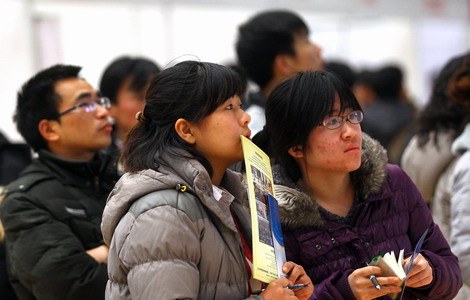 |
|
|
|
|||||||||||
|
 Two job seekers look for recruitment information at a job fair in Beijing earlier this year. [Photo / China Daily] |
BEIJING - China's working population is expected to stop growing next year, leading to labor shortages and higher inflation in the long term, a National People's Congress deputy said on Sunday.
But the changes may also lead to an increase in wages for low-income workers.
"We should prepare for living with higher inflation in the coming years and not expect the consumer price index (CPI) to be lower than 3 percent," Cai Fang, director of the Institute of Population and Labor Economics at the Chinese Academy of Social Sciences, told China Daily.
The working population is classed as those aged 15 to 64 who are fit for employment.
Average labor costs in China rose by more than 20 percent in 2011. "Its increase rate is likely to continue shooting up this year because the economy is expected to expand at a relatively high pace," said Cai.
Shanghai, China's most populous city, will raise its minimum wage from 1,280 yuan ($230) a month to 1,450 yuan from April 1. Beijing increased the basic rate on Jan 1 to 1,260 yuan, 8.6 percent higher than in 2011. And Guangzhou raised it to 1,300 yuan, an increase of 15.4 percent on last year.
"Wage increases in the low-income group are boosting spending on basic consumer goods, such as food and clothes, which is pushing up inflation," he said.
The deputy expects a 4 percent CPI target with a 7.5 percent economic growth rate this year. The government plans to release these two annual economic goals in the premier's work report on Monday.
January's CPI jumped to 4.5 percent from the 4.1 percent in December, the year's lowest. Food prices increased 10.5 percent year-on-year, contributing 3.29 percentage points to the CPI, according to the National Bureau of Statistics.
Together with a 9.2 percent GDP, inflation over the full year has grown 5.4 percent on the previous year.
In order to curb inflation, the central government tightened monetary policy by increasing interest rates and the required reserve ratios for commercial banks last year. It also has taken measures to prevent sharp price increases in consumer goods.
"We should not be too worried about increasing inflation because the rise in the price of food and basic daily goods can bring more profit to the low-income farmers and workers, which can narrow the earnings gap and rebalance income distribution," said the NPC deputy.
With the removal of price-control measures, people with the lowest income should get subsidies from the government to make up for losses caused by inflation, Cai suggested.
"These subsidies can come from the government's fiscal income, and more money should be paid into basic public services, including education and medical treatment, for the low-income group," he added.